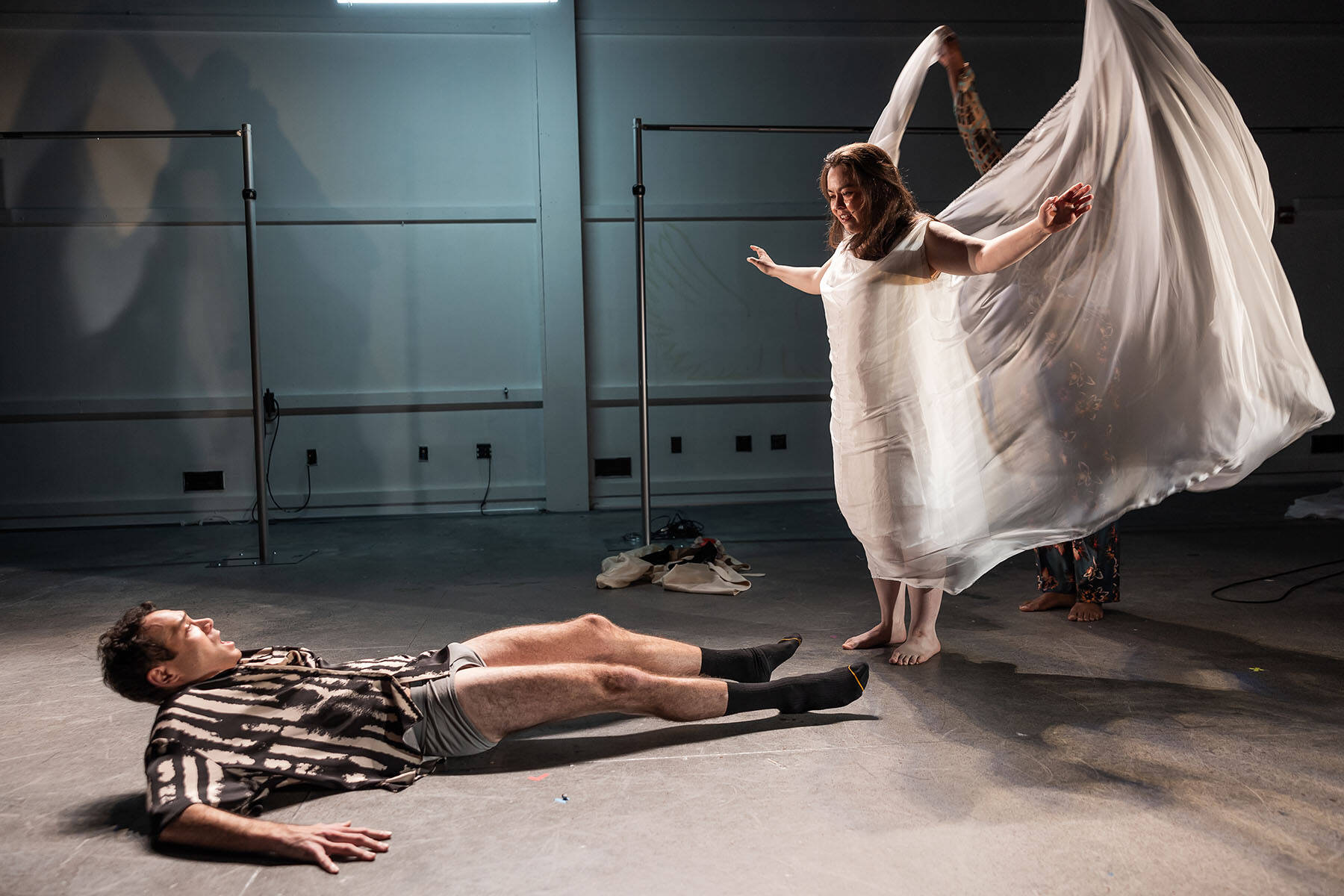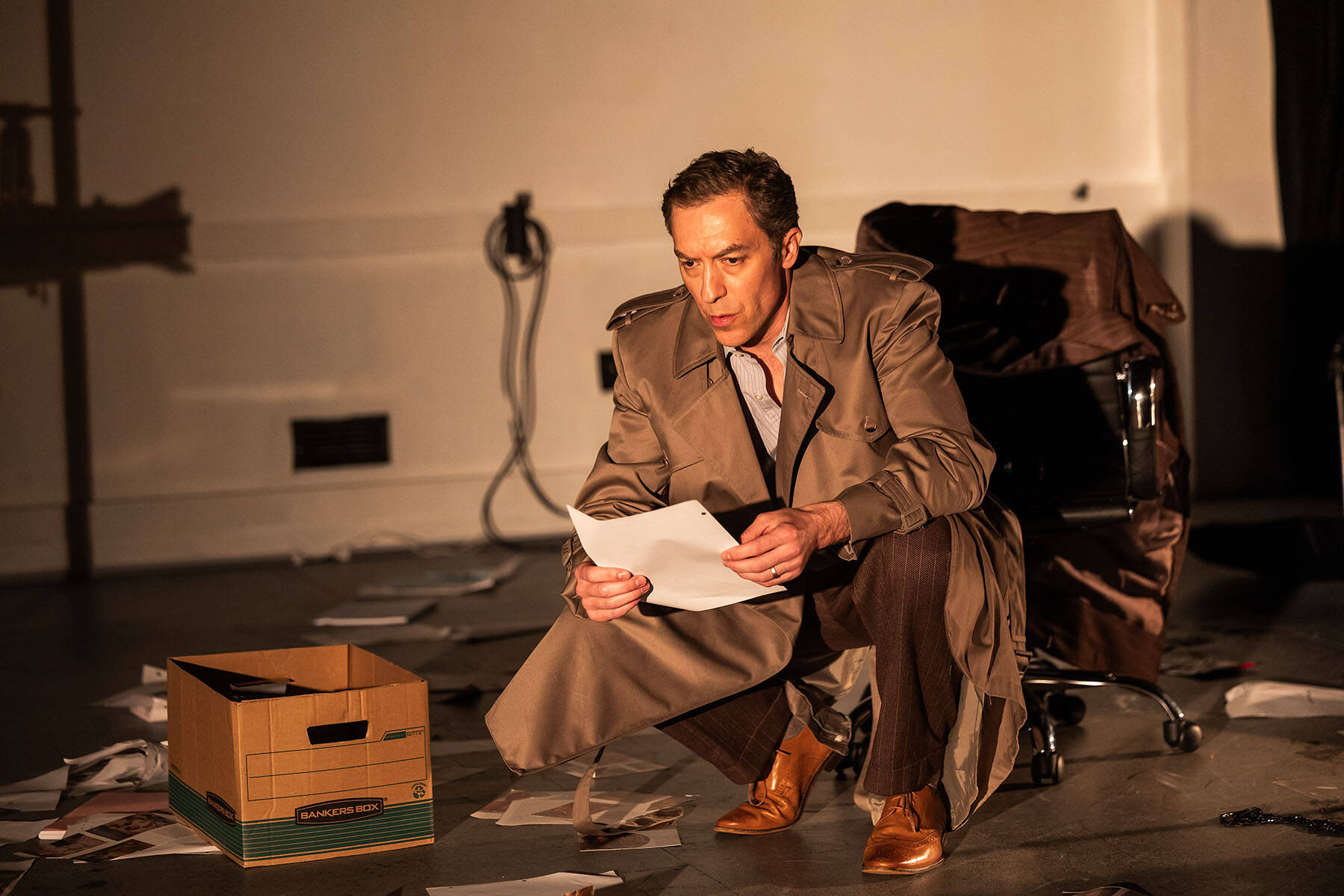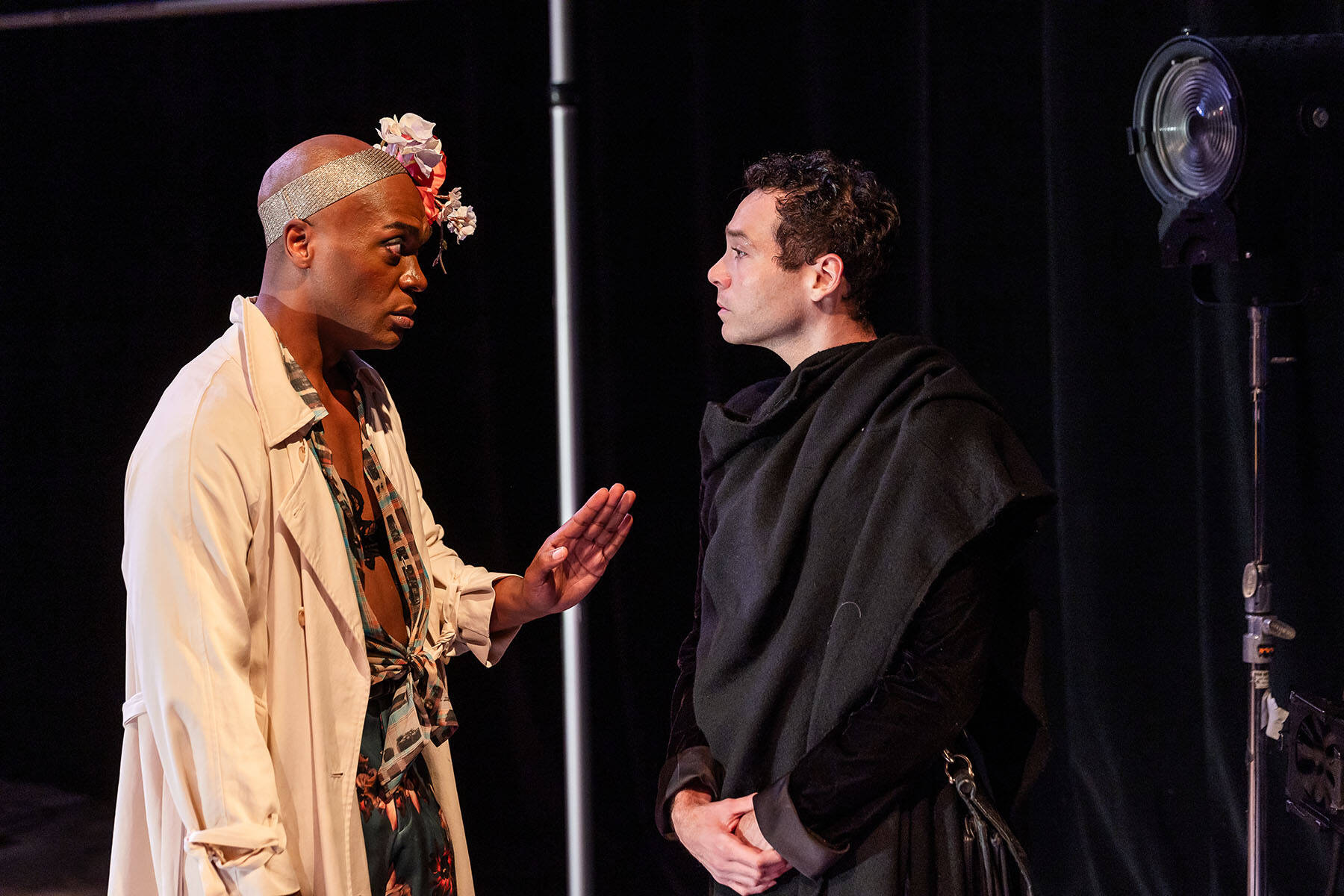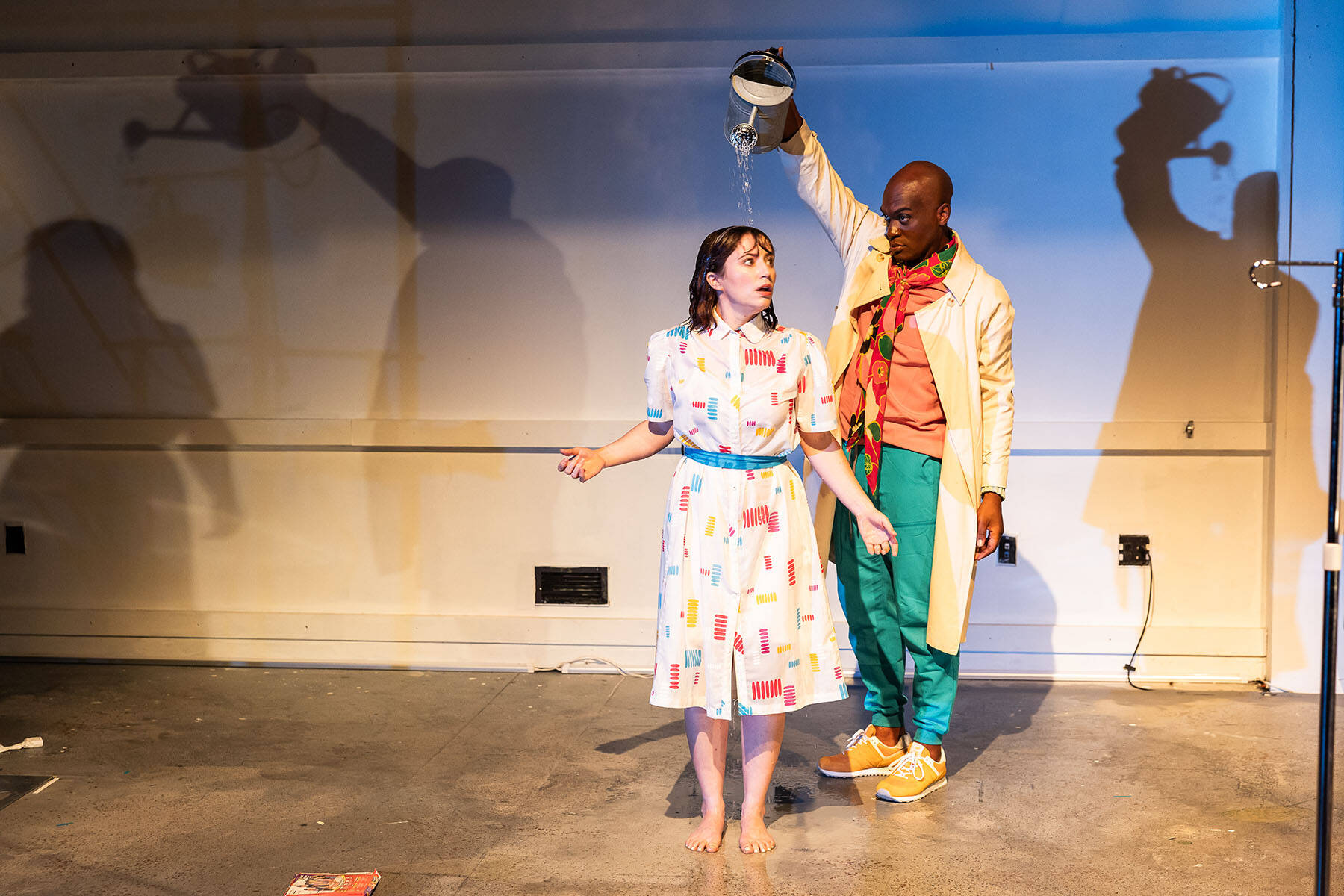Advertisement
Review
Tony Kushner's 'Angels in America' gracefully alights at Central Square Theater

"Perestroika," Part 2 of Central Square Theater and Bedlam’s co-production of Tony Kushner’s “Angels in America,” fairly crackles with energy and urgency. The “great work” that began in “Part 1: Millennium Approaches” (initially mounted in April) continues as we follow an absolutely brilliant Eddie Shields, who portrays Prior Walter, a man whose weakening body, ravaged by AIDS, increasingly opening his mind to “thresholds of revelation.”
We also return to Louis Ironson, portrayed by Zach Fike Hodges with a delicate balance of Louis’s most endearing and annoying traits. Unable to expiate his guilt over abandoning Prior, Louis hooks up with the married Mormon Republican Joe, portrayed in Part 2 by Alexander Platt. For his part, Joe finally confronts his homosexuality, which leads his mother Hannah to New York where she unexpectedly befriends Prior.
The ghost of Ethel Rosenberg (Debra Wise as both Hannah Pitt and Ethel) joins Louis to recite Kaddish over red-baiting Roy Cohn (a snarling Barlow Adamson), who won’t admit that he’s gay or has AIDS. Cohn, an acolyte of Sen. Joseph McCarthy and a mentor of Donald Trump, did in fact prosecute Ethel and Julius Rosenberg.
But that perfunctory synopsis doesn’t begin to encompass Kushner’s fascinating swirl of ideas about religion, race and politics, despair, abandonment, forgiveness and grace, or director Eric Tucker’s fluid vision for bringing the 1993 Pulitzer and Tony-winning epic to life. Tucker’s Bedlam theater company has developed a much-lauded reputation for simple yet dynamic productions of classics such as “Saint Joan,” “Twelfth Night/What you Will,” “The Crucible,” (all with Central Square) and “Sense and Sensibility” at the American Repertory Theater, that remind us of the power of the story and their characters.

Here he takes Kushner’s theme of the very human need to keep moving; our determination to rebuild in the face of devastation; and our astonishing ability capacity for hope and creates a propulsive rhythm for this production. He meets every complex idea, character and situation with simplicity and imagination, keeping the audience’s attention tightly focused on these deeply flawed characters who are trying to make sense of the chaotic world they are living in, choosing what to leave behind and how to keep dreaming ahead.
Every aspect of this production supports Tucker’s vision for illuminating Kushner’s theme of forward motion. Deb Sivigny’s set seems bare bones but then deconstructs during the course of the play as pieces of scaffolding become rails that people lean on to look out at a view and simple black backdrops become escape routes.
John Malinowski’s remarkably versatile lighting effects play with shadows, both cast and eliminated by flashlights, worklights, spotlights and overhead neon glare. Costume designer Daniele Tyler Matthews’s swaths of fabric disguise and define characters more clearly than the familiar uniform of a man’s suit or a woman’s dress. And Kai Bohlman’s original music and sound design nods to 1980s playlists while delivering the angelic and foreboding rumbles that sends shivers up the spine.

Tucker’s endlessly inventive direction leans into uniquely theatrical choices that propel the action and never allow the audience to relax. There is nary a pause between scenes, with actors often strategically positioned under a sheet or in a nearby chair or bed, jumping in on cue. Actors also make strategic use of swivel chairs, spinning and gliding, being pushed or pulled, and in the case of Cohn’s stash of the life-saving AZT therapy, a mini-frig on wheels is attached to him like an IV.
There are also roller skates, especially in a penultimate scene in which a cadre of black-draped angels express bewilderment at Prior’s refusal to be their prophet even after they have shown him the devastation that is to come. Still, he says, “Bless me anyway. I want more life.”
Kushner’s characters mature in Part 2, and while that doesn’t mean there’s a neat resolution to anything, it does offer new insights into characters we might have taken for granted. Harper Pitt (Kari Buckley in a richly layered and luminous performance) has been using Valium to dull her unhappiness, to cloud the truth about her marriage. Her hallucinations, an amusing subplot in Part 1, are heartbreaking here as they emphasize how utterly alone she is. Once she finally confronts her husband about the lie they have been living, she is able to break free and spin forward toward her own life.
Wise, who plays the world’s oldest living Bolshevik in “Perestroika’s” opening scene (the title references the restructuring of the USSR, which occurred the year before the play is set), also plays Hannah Pitt, Joe’s no-nonsense mother. These two bookended individuals ask and then answer the question “Can we change?”
Actors also use each other to create utterly believable illusions. Maurice Emmanuel Parent, as Belize, the sometime drag queen, nurse and loyal friend to both Prior and Louis, is stunning as he grows increasingly annoyed with Louis and his victimized rant; as he endures the racist invective of the nasty Roy Cohn; and as the audience for Prior’s account of his vision in which an angel (Helen Hy-Yuen Swanson, as formidable as a nurse and a homeless woman as she is as an angel) designated him as the Prophet. But Parent, by simply standing behind Swanson, and gently moving his arms, becomes the angels’ wings, a character in a Mormon diorama, and most powerfully, as an ACT-UP performer doing a drag version of Grace Jones’ “Slave to the Rhythm.”
That rhythm — of life, of love, of movement, of hope — drives Tucker’s production. By infusing every aspect of this production with that racing heartbeat, Tucker makes room for Kushner’s ideas, always grounded in the deep emotions of his unexpectedly heroic characters.

"Angels in America: A Gay Fantasia on National Themes. Part 2: Perestroika," presented by Central Square Theater and Bedlam, continues at Central Square Theater through Oct. 8. “Part 1: Millennium Approaches” is staged Sept. 30 and Oct. 7.